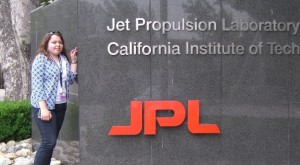By Michele Tallarita ’12

Jaclyn Avidon '12 interned at NASA’s Jet Propulsion Lab at the California Institute of Technology.
Jaclyn Avidon ’12 (New York, N.Y.) has interned with NASA, done EXCEL Scholars research on the surface temperature of Jupiter’s icy moon Europa, and now has presented work at the premiere conference for planetary scientists.
Avidon, a physics major, presented her research at the 42nd Lunar and Planetary Science Conference in The Woodlands, Texas, last month. Her presentation represented a portion of her honors thesis, and explored the properties of liquids found on the freezing moons of the outer solar system. She presented the poster along with her thesis adviser and co-author, Andrew Dougherty, associate professor and head of physics.
The 42nd Lunar and Planetary Science Conference brings together over 2,000 international specialists in petrology, geochemistry, geophysics, geology, and astronomy to present the latest results of research in planetary science. It has been a focal point for planetary science research since its beginning in 1970, when it was known as the Apollo 11 Lunar Science Conference.
“The conference was great,” says Avidon. “I’ve never been asked such wonderfully technical questions before. It was also neat to meet many of the people whose papers I’ve read over and over again—I was starstruck.”
Avidon has been working on the research involved in her poster since she began her EXCEL research with Dougherty in summer 2010. Her project focuses on the “aqueous solutions” thought to be present on distant celestial bodies like Jupiter’s moon Europa and Saturn’s moon Titan. She aimed to nail down the properties of these solutions, which required using advanced technology to create super cold, high-pressure conditions—simulating the climates of the icy moons.
Avidon’s favorite part of the research was getting involved in every aspect of the experimentation. “Professor Dougherty let me tweak some of the computer programming that runs the experiment, adjust the physical apparatus, run the experiment, analyze the data, and organize and present the results,” she says. “It takes about one week to get each data point, and you definitely have a much greater sense of accomplishment when you get to see the acquisition of that data point from start to finish.”
At the conference, Avidon received feedback on her research and heard a series of lectures about science education and public outreach. She plans to pursue science education and public outreach after graduation, and was inspired to see so many others devoted to the field.
A science lover, Avidon completes her tenure at Lafayette having participated not only in academic activities like research and the Physics Club (as president), but in other activities like the Lafayette Dance Team and working as a tour guide for admissions. She calls her experience “a nice variety.”

2 Comments
congatulations on turning out such a great space age scientist! Icy cool topic!
Way to go Jaclyn!
Comments are closed.